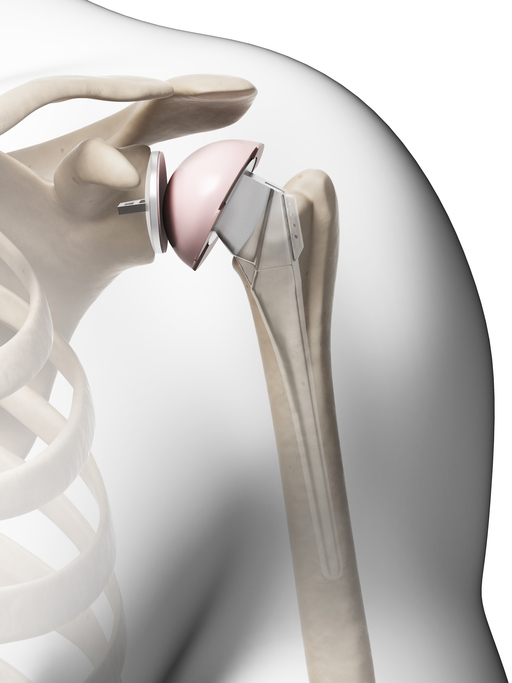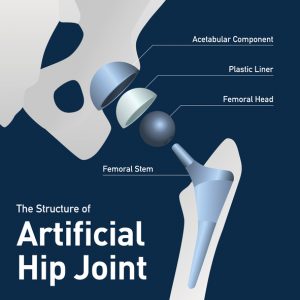Shoulder replacement
Any place in the body where two or more bones meet is called a joint. In the case of the shoulder, three bones come together: the humerus (upper arm), scapula (shoulder blade) and clavicle (collarbone). The head, or ball, of the humerus fits into the shallow socket of the scapula (glenoid) and, as such, is a ball-in-socket joint. A protective coating, cartilage, and a thin membrane help lubricate the joint to enable smooth movement. Muscles and tendons provide stability and support.
It’s not uncommon for the shoulder to become damaged by injuries, arthritis or other conditions. Patients with shoulder problems often experience pain, loss of motion, and/or weakness, any of which can significantly impact their quality of life.
Several conditions can lead to joint pain, including osteoarthritis, rheumatoid arthritis, post-traumatic arthritis and avascular necrosis. Specific to the shoulder joint, a rotator cuff tear may lead to a condition called cuff tear arthropathy, where changes in the shoulder joint due to the tear may lead to arthritis and destruction of the joint cartilage.
What is shoulder replacement?
Welia Health’s orthopedic specialists are experienced in performing joint replacements, including shoulder replacements. During shoulder replacement surgery, the damaged parts of the shoulder are removed and replaced with artificial components, called a prosthesis. The treatment options are either replacement of just the head of the humerus bone (ball) or replacement of both the ball and the socket (glenoid).
When is surgery recommended?

In order to determine the cause and severity of the shoulder’s condition, our orthopedic specialists conduct a series of diagnostic tests, which may include simple x-rays, more sophisticated MRI imaging, comprehensive physical examination and a thorough medical history review.
The American Academy of Orthopaedic Surgeons suggests several reasons why shoulder replacement surgery may be recommended:
- Severe shoulder pain that interferes with everyday activities, such as reaching into a cabinet, dressing, toileting, and washing.
- Moderate to severe pain while resting. This pain may be severe enough to prevent a good night’s sleep.
- Loss of motion and/or weakness in the shoulder.
- Failure to substantially improve with other treatments such as anti-inflammatory medications, cortisone injections, or physical therapy.
In most cases, patients will follow a more conservative treatment plan to control symptoms without surgery. This may include an exercise program, physical therapy, or medical therapy. If nonsurgical treatments do not provide relief, shoulder replacement may be recommended. In these cases, the Welia Health team spends ample time with each surgical patient to review potential risks and complications, including those related to the surgery and others that can occur over time following surgery.
What can I expect from surgery?
If both the Welia Health orthopedic specialist and patient determine that surgical treatment is the best approach, the orthopedic specialist guides each patient through the entire process to prepare them for what to expect before, during and following the procedure.
While some pain is normal during recovery, medications are often used on a short-term basis to aid recovery. You will have a sling to support and protect your shoulder in the weeks after surgery. Physical therapy, which will within days following surgery, strengthens the muscles around the shoulder and increase the range of motion.
A patient’s active engagement in their recovery process is critical to long-term success. A detailed rehabilitation plan is a crucial part of the recovery process. Following recommendations on wound care, nutrition, exercise and medications cannot be overstated.
The majority of patients are able to perform daily activities more easily after shoulder replacement surgery. Most people can expect their shoulder replacement to last for many years, giving them an improved quality of life with less pain, along with improved motion and strength.
Orthopedic services are available in Mora, Hinckley and Pine City. Call Welia Health at 320.679.1313 or schedule an appointment using MyChart.
A referral may be required from your primary care provider, please check with your insurance carrier.



